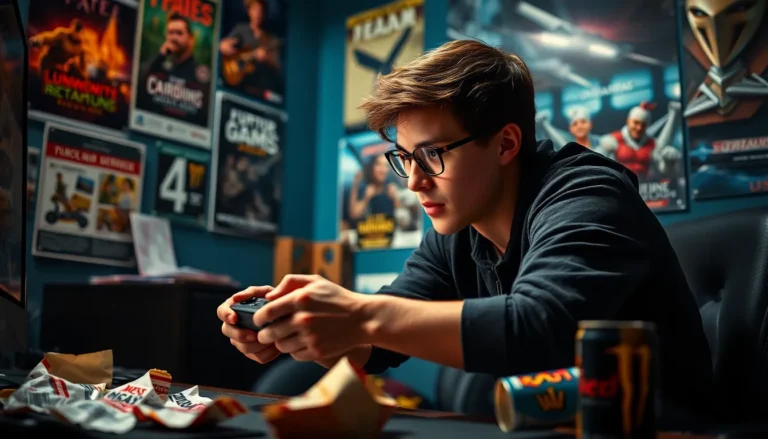In a world where gaming is as common as breathing, one particular phenomenon has emerged to capture the hearts—and sometimes the sanity—of players: game overdertoza addiction. Picture this: you’re deep into a quest, your snacks are strategically placed, and your friends are wondering if you’ve been abducted by aliens. Welcome to the hilarious yet serious realm of overdertoza, where the line between fun and obsession blurs faster than a speedrun.
Table of Contents
ToggleUnderstanding Game Overdertoza Addiction
Game overdertoza addiction represents a growing concern in gaming culture. Gamers often find themselves deeply immersed, leading to potential negative impacts on their lives.
Definition of Game Overdertoza Addiction
Game overdertoza addiction refers to a compulsive behavior where individuals play games excessively, prioritizing gameplay over daily responsibilities. This addiction can manifest in various forms, such as neglecting personal relationships, work, and health in favor of gaming sessions. Individuals experiencing this addiction may find it challenging to regulate their gaming time, often leading to feelings of guilt or withdrawal when unable to play. Recognizing this behavior is crucial in understanding its severity and addressing the challenges associated with it.
Signs and Symptoms
Identifying signs of game overdertoza addiction is essential for intervention. Common symptoms include neglecting responsibilities, such as school or work, and experiencing a decline in physical health. Gamers often exhibit withdrawal symptoms when not playing, including irritability or anxiety. Social isolation frequently occurs as players prioritize games over interactions with family and friends. Additionally, an obsession with game-related content can dominate thoughts, affecting daily activities and emotions. Recognizing these signs early can lead to timely support and recovery.
Causes of Game Overdertoza Addiction

Game overdertoza addiction stems from various interconnected factors. Understanding these causes can shed light on its prevalence and impact.
Psychological Factors
Psychological factors significantly contribute to game overdertoza addiction. Many individuals seek escapism from reality, finding refuge in immersive gaming experiences. Emotional issues, such as anxiety or depression, often lead players to an online world where they feel more in control. Low self-esteem can also drive a gamer toward digital victories as a way to boost their confidence. Research shows that the brain’s reward system activates during gameplay, releasing dopamine and creating a cycle of reinforcement. This cycle encourages excessive playtime, making it difficult for individuals to resist the pull of their favorite games.
Social Influences
Social influences play a crucial role in the development of game overdertoza addiction. Gamers often feel a sense of community within gaming platforms, fostering relationships with other players. Friend groups that prioritize gaming can lead to social isolation from non-gaming peers. Additionally, competitive environments within games motivate players to invest more time in achieving higher ranks or completing challenges. Media portrayals of gaming as a primary leisure activity further perpetuate this trend, normalizing excessive gameplay. Social recognition from in-game achievements and status can reinforce addictive behaviors, making moderation challenging for many players.
Effects of Game Overdertoza Addiction
Game overdertoza addiction leads to significant negative impacts on both mental health and physical well-being. Understanding these effects provides insight into the importance of addressing this addiction.
Mental Health Impact
Anxiety and depression frequently surface due to excessive gaming. Gamers often experience feelings of guilt after neglecting responsibilities. Social isolation contributes further to declining mental health. Irritability may become common when gaming is not accessible. Withdrawing from friends can deepen feelings of loneliness and distress. Many individuals struggle with low self-esteem, which feeds into the cycle of addiction. Cravings for gameplay reinforce feelings of inadequacy, creating a persistent loop of emotional challenges.
Physical Consequences
Neglecting physical health often occurs with game overdertoza addiction. Sedentary lifestyles can lead to weight gain and cardiovascular issues. Eye strain and discomfort are common complaints among avid gamers, affecting vision clarity. Sleep disturbances frequently arise, resulting from extended gaming sessions disrupting normal sleep patterns. Poor nutrition may also develop, as individuals prioritize gaming over healthy eating. Furthermore, repetitive strain injuries can impact hands and wrists, leading to chronic pain. Addressing these physical manifestations is essential for overall well-being and recovery.
Treatment Options for Game Overdertoza Addiction
Addressing game overdertoza addiction involves various approaches that focus on recovery and prevention. Both professional help and self-help strategies play crucial roles in overcoming this addiction.
Professional Help
Psychologists and licensed counselors specializing in gaming addiction can provide tailored support. Cognitive behavioral therapy (CBT) proves effective, helping individuals understand their triggers and reshape their gaming habits. Support groups may offer shared experiences and valuable insights from peers facing similar challenges. Treatment programs can also assist in developing coping strategies to manage cravings and build a healthier balance between gaming and daily life. Engaging with professionals ensures a structured path toward recovery.
Self-Help Strategies
Self-help strategies empower individuals to manage their gaming habits independently. Establishing clear boundaries for gaming time promotes healthier routines. Keeping a gaming journal allows players to track their gaming hours and reflect on their emotions, fostering awareness of addictive behaviors. Engaging in physical activities provides alternative sources of enjoyment and helps reduce screen time. Finding new hobbies or social activities encourages connections outside the gaming world, decreasing feelings of isolation. Prioritizing self-care activities enhances overall well-being and supports recovery efforts effectively.
Game overdertoza addiction poses a significant challenge in today’s gaming landscape. As individuals navigate the fine line between enjoyment and obsession, awareness becomes essential. Recognizing the signs and understanding the underlying causes can empower gamers to seek help and make necessary changes.
By addressing both mental and physical health impacts, players can reclaim control over their lives. Treatment options and self-help strategies offer pathways to recovery, emphasizing the importance of balance. Ultimately, fostering a healthier relationship with gaming can lead to improved well-being and stronger connections with others.




